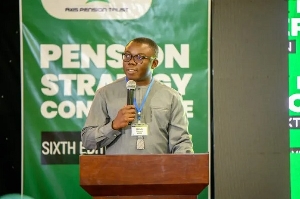 Afriyie Oware, Chief Executive Officer of Axis Pension Trust
Afriyie Oware, Chief Executive Officer of Axis Pension Trust
The Chief Executive Officer (CEO) of Axis Pension Trust, Afriyie Oware, has emphasised the critical need for a strategic shift in investing pension funds in order to cushion contributors.
Mr. Oware urged a minimum of 20 percent diversification offshore to hedge against local economic shocks. However, he acknowledged potential regulatory hurdles and limited access to foreign currency.
“As we face the prospect of an economic after-shock in the near term [2027/28], we must act decisively to hedge the purchasing power of our contributors. This requires a collaborative effort — to advocate for policy reforms that ensure a sustainable and resilient economic environment—one that fosters business innovation, stimulates private sector growth and ultimately secures the retirement outcomes of Ghanaian workers,” he argued.
The CEO’s remarks come against the backdrop of the prevailing economic and fiscal crisis, highlighting vulnerabilities in pension fund portfolios.
In an address at the 2024 Pension Strategy Conference, Mr. Oware stated: “With only 12 percent of our national savings invested in the productive private sector, the path forward is clear. We must direct more investment into the private sector, diversifying away from government bonds to secure the retirement outcomes of Ghanaian workers”.
“Ensuring exchange rate stability wasn’t part of the trustee’s mandate, but it’s essential. Trustees must have a say in how savings are invested, fostering controlled asset creation and innovation in private market investing,” he commented.
Highlighting flaws in the current investment model, Mr. Oware criticised the focus on paying government bills rather than producing economic value, advocating a shift toward real estate, unlisted equity and private credit.
“The National Pensions Regulatory Authority (NPRA) should guide the market with sound standards for private market investing, not to control it with excessive approval requirements,” he insisted.
Drawing attention to the grim economic outlook, the CEO warned of a looming retirement crisis. With Ghana’s pension fund assets at US$6billion and 2 million contributors – a stark contrast to Botswana’s US$7billion with 400,000 contributors, he stressed the need for a strategic shift.
Mr. Oware also called for a collaborative approach in advocating policy reforms, fostering business innovation and stimulating private sector growth.
“Our decisions and strategies have the power to perpetuate financial vulnerability or pave the way for a resilient and prosperous future for Ghanaian workers. We must harness collective wisdom to chart a new course for pension fund investment,” he stated.
The consequences of the recent economic upheavals have been dire, with pension funds suffering significant losses in purchasing power. He painted a bleak picture of retirement prospects, noting the shift in burden toward workers as government resources dwindle.